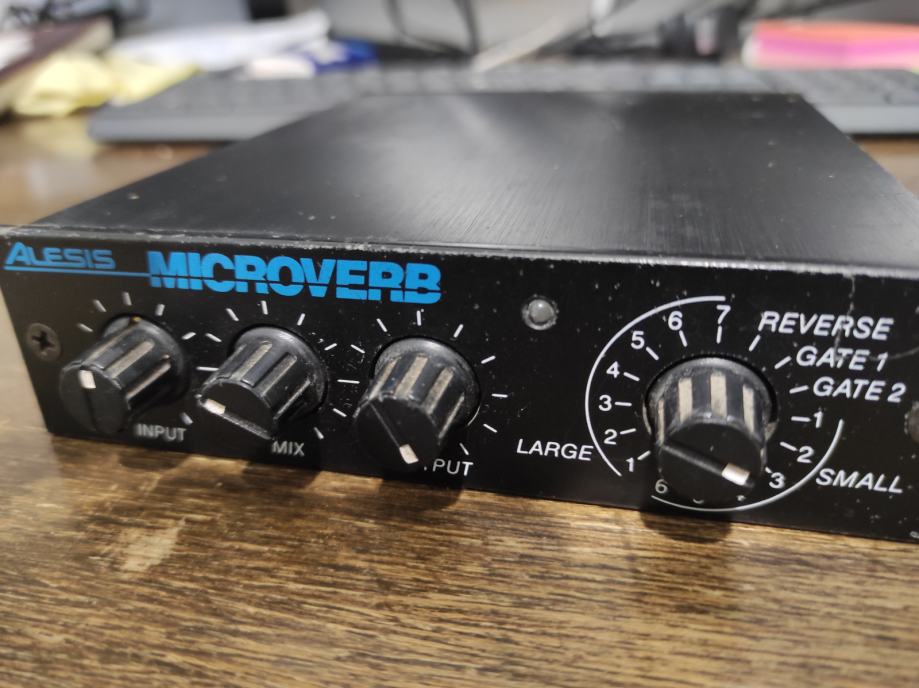Ta oglas ni aktiven.
Prebrskaj podobne oglase.
Osnovne informacije
- Vrsta ponudbe
- Prodam
- Lokacija
- Jugovzhodna Slovenija, Šentjernej, Šentjernej
- Stanje
- rabljeno
Opis oglasa
Alesis MICROVERB-1 (Reverb processor)
Legendarni reverb processor, zaradi neuporabe prodam.
-----------------------------------------------------
REVERBERATION IS STILL the most important effect used in sound recording. And until recently, one of the main factors separating the sound of a cheap demo studio from that of a professional facility was the quality of the reverb used.
But thanks to machines like the Alesis MIDIverb, the digital reverb revolution is well underway, and plenty of small-studio users are finding it possible to match the kind of reverb quality achieved on records.
And if the £395 the MIDIverb costs is still beyond your grasp, Alesis can now offer you the Microverb. It's a small (about the size of a car radio), black, aluminium-cased device with only three pots, an LED and a rotary selector switch on its front panel. The LED is tri-coloured and acts as a basic input level indicator (like a breathalyser, but without the consequences).
There weren't many frills on the original Midiverb, but what there were have had to go on the new machine: so there's no MIDI control of programs, and only 16 preset effects (no names, just numbers).
Like the MIDIverb, the Microverb has stereo inputs and outputs, though the reverb input is derived from a mix of the left and right input channels in the usual way. This means, though, that you can use the unit with a stereo instrument without having to resort to a separate mixer. The reverb output is stereo whether the input is stereo or not, but there is one further refinement: having a stereo input normally means that a dry signal connected to just one input comes out of only that side while the reverb is working in stereo - on the Microverb, one input is configured such that when used on its own, it's routed to both outputs equally.
There are both input and output level controls, and this, combined with a high input impedance, means you can plug virtually anything into the Microverb and be sure of a decent match. I tried an electric guitar and the +4dB output from a mixing desk with equally good results. The output level control ensures the level is always right for the next piece of equipment in the chain, so the Microverb is equally at home in the studio or at a local pub gig. And particularly handy for live use is a rear-panel remote socket, which takes an ordinary footswitch to act as a bypass control.
The MIDIverb's smooth, quiet sound was the benefit of using a 12-bit conversion system, but the Microverb uses 16 bits, which not only produces a smoother reverb sound, but also a staggering 90dB dynamic range: about as quiet as a CD player. The same RISC (Reduced Instruction Set Computer) is used to achieve the high computing speed needed to recreate dense, complex reverb patterns, and the system has the same 10kHz bandwidth as far more expensive machines.
The effects themselves come in four categories: small spaces, large spaces, gated and reverse. The first six ('small') offer a good choice of ambient, room and plate sounds, with the smallest sounding like a coal bunker and the largest like a school gym. There are also a couple of plate-like treatments with fast attacks followed by smooth, bright decays. These work particularly well on drums and can add sparkle to vocals.
The seven 'large' effects start out with something resembling a stately home and end up with a massive 20-second cavern. In between are long plates and different rooms and halls, including one or two with pronounced, characterful early reflections. The larger halls have a slow build-up to the reverb part of the sound, while the plate and room sounds have a much faster attack.
The single reverse setting has around half-a-second of decay, and is certainly pretty spectacular. Lastly, the gates are best described as short and medium, and give the now traditional (boring?) gated drum sound. However, they can also sound effective on guitar and vocals, so don't be put off experimenting.
The Microverb is the cheapest digital reverb currently in production. It doesn't supercede the MIDIverb; it just makes the basics of that machine's appeal available to a wider audience of studio users. In fact, I can see a lot of keyboardists and guitar players going for the Microverb, even if they don't have access to any recording facilities. Using it is simplicity itself; listening to it - especially next to a spring reverb - is a revelation.
Legendarni reverb processor, zaradi neuporabe prodam.
-----------------------------------------------------
REVERBERATION IS STILL the most important effect used in sound recording. And until recently, one of the main factors separating the sound of a cheap demo studio from that of a professional facility was the quality of the reverb used.
But thanks to machines like the Alesis MIDIverb, the digital reverb revolution is well underway, and plenty of small-studio users are finding it possible to match the kind of reverb quality achieved on records.
And if the £395 the MIDIverb costs is still beyond your grasp, Alesis can now offer you the Microverb. It's a small (about the size of a car radio), black, aluminium-cased device with only three pots, an LED and a rotary selector switch on its front panel. The LED is tri-coloured and acts as a basic input level indicator (like a breathalyser, but without the consequences).
There weren't many frills on the original Midiverb, but what there were have had to go on the new machine: so there's no MIDI control of programs, and only 16 preset effects (no names, just numbers).
Like the MIDIverb, the Microverb has stereo inputs and outputs, though the reverb input is derived from a mix of the left and right input channels in the usual way. This means, though, that you can use the unit with a stereo instrument without having to resort to a separate mixer. The reverb output is stereo whether the input is stereo or not, but there is one further refinement: having a stereo input normally means that a dry signal connected to just one input comes out of only that side while the reverb is working in stereo - on the Microverb, one input is configured such that when used on its own, it's routed to both outputs equally.
There are both input and output level controls, and this, combined with a high input impedance, means you can plug virtually anything into the Microverb and be sure of a decent match. I tried an electric guitar and the +4dB output from a mixing desk with equally good results. The output level control ensures the level is always right for the next piece of equipment in the chain, so the Microverb is equally at home in the studio or at a local pub gig. And particularly handy for live use is a rear-panel remote socket, which takes an ordinary footswitch to act as a bypass control.
The MIDIverb's smooth, quiet sound was the benefit of using a 12-bit conversion system, but the Microverb uses 16 bits, which not only produces a smoother reverb sound, but also a staggering 90dB dynamic range: about as quiet as a CD player. The same RISC (Reduced Instruction Set Computer) is used to achieve the high computing speed needed to recreate dense, complex reverb patterns, and the system has the same 10kHz bandwidth as far more expensive machines.
The effects themselves come in four categories: small spaces, large spaces, gated and reverse. The first six ('small') offer a good choice of ambient, room and plate sounds, with the smallest sounding like a coal bunker and the largest like a school gym. There are also a couple of plate-like treatments with fast attacks followed by smooth, bright decays. These work particularly well on drums and can add sparkle to vocals.
The seven 'large' effects start out with something resembling a stately home and end up with a massive 20-second cavern. In between are long plates and different rooms and halls, including one or two with pronounced, characterful early reflections. The larger halls have a slow build-up to the reverb part of the sound, while the plate and room sounds have a much faster attack.
The single reverse setting has around half-a-second of decay, and is certainly pretty spectacular. Lastly, the gates are best described as short and medium, and give the now traditional (boring?) gated drum sound. However, they can also sound effective on guitar and vocals, so don't be put off experimenting.
The Microverb is the cheapest digital reverb currently in production. It doesn't supercede the MIDIverb; it just makes the basics of that machine's appeal available to a wider audience of studio users. In fact, I can see a lot of keyboardists and guitar players going for the Microverb, even if they don't have access to any recording facilities. Using it is simplicity itself; listening to it - especially next to a spring reverb - is a revelation.
Zemljevid
- Oglas je objavljen
- 28.03.2024. ob 13:54
- Do poteka še
- oglas je potekel
- Oglas je prikazan
- 98 -krat











